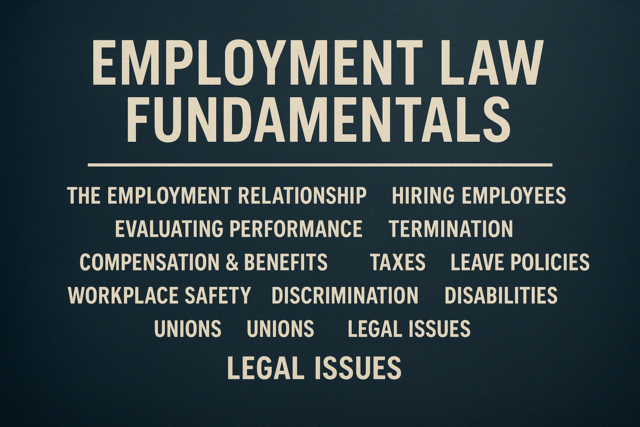The employment type dictates the nature and circumstances of the person's employment, and therefore how any changes can be made to that employment. There are factors involved that dictate the entire situation that are tied to the type, as well as factors of industry and business. Likewise, certain industries may have more of one employment type than others because of the nature of that industry.
This article will look at the different employment types and the circumstances that are attached to them. Information regarding how those types are first contracted, the attributed requirements, and what is needed for termination will be discussed for each type. Additional information regarding some special circumstances that may present for a specific type will also be included.
Why Is The Employment Type Important For Lawful Termination?
The bulk of the workforce is made up on at-will employees. This basically means that these are workers who can leave their positions at any time, and by any means (fired, quit, etc.) for any legal reason.1 Most of the time, the paperwork that an at-will employee fills out when they are first hired will state that they will work at-will. It will also denote the terms of their employment as an at-will employee, including information that states that their employer can fire them without advanced notice. They are usually acting in a full-time capacity-30-40 hours per week or more-although at-will employees can also be part-time (more on that later).
As at-will employment is fairly common, it can be found in nearly every industry in the economy. There are also few complications that can arise with termination because it is a simple classification. The designation actually provides a lot of leeway for what employers and employees can do, including changing the terms of employment (e.g. transitioning to another designation, modifying wages, etc.), and flexibility of actions.2 The main protections that at-will employees have is protection from being fired for illegal reasons, such as retaliation or due to discrimination.
Part-Time Employees
Temporary Employees
As the name suggests, temporary employees are not intended to be permanent fixtures in a company or business. They often have a set end date for when their employment will be terminated, although that can change depending on circumstances.4 These employees may be hired by the business itself to fulfil a specific need or position-substitute teachers, for example, are often treated as temporary employees. They can also be supplied through temp agencies, who businesses contact when they have a position that needs a short-term stand-in. Due to their temporary status, there's quite a bit of flexibility when it comes to aspects of scheduling, demand, and availability for temporary employees.
However, they are the same as any standard employee in the position they are filling. This means that they have the same rights and need to be treated as such if they are being terminated before their set end-date. In some cases, a temporary employee may have a contract that details the terms of their employment with the business, especially if they are through an agency. Referring to the terms in the contract regarding early termination or any changes to the timeline of their employment is often best to avoid any legal issues.
Commission Employees
Employees who work on commission tend to be paid based on the results of their work.5 It's more of a rewards system rather than a set salary regarding how they work and how their employment is set up. A lot of those who work in sales-especially in selling large items like vehicles and furniture-will be commission employees, which explains why customers are constantly approached and bothered by sales people in some of those businesses. Those employees, as commission-based employees, are not getting paid if purchases are not attributed to them; even if it may not sound right for someone to work without pay, it's legal in that capacity.
Termination of commission employees is often going to be based on the employee's performance, i.e. if they're not making any sales for whatever reason. In some cases, termination might be more of a blessing than a curse because they are unable to be paid based on the terms of their employment. Employers often set a quota for the number of sales that commission employees are supposed to make in a set time (e.g. per month), and that is established when they are hired with the potential for it to be adjusted based on circumstances. Failure to meet the quota-so long as the employees were made aware of what the quota is-is considered a justifiable and legal reason for termination. Their behavior is also acceptable grounds for termination, especially if it is directly tied to their poor performance (e.g. rude or hostile with customers).
Contract Employees
Simply put, contract employees are people who are employed with the business under a contract or other similar agreement. Any other employment type discussed in this article could also double as contract employment should a contract be introduced. The contract details everything about the person's employment, including their status within the company, responsibilities, salary and benefits, and the disciplinary measures that will be directed at them for violations of any kind.6 They also tend to include information regarding how the person's employment can be terminated; the fastest way to make their termination unlawful is to breach the contract and/or fire them contrary to those agreed upon terms.
Contracts are often in one of three forms, all of which carry their own advantages and disadvantages7:
• Written Contract-Usually the most detailed and legally binding of the three, a written contract is most commonly used. The terms of the person's employment are clearly laid out in the document. It's the better option for intricate employment agreements, but it can be used for any kind of employment type. Before the contract is finalized and signed, the terms may be negotiated on and adjusted to fit the needs of everyone involved and the circumstances of employment. Should either the employee or the employer belief that the other party has lapsed on their part of the contract or if the employee's termination was possibly unlawful, then the written contract can be used as evidence and support any claims made. Written contracts provide a lot more protection, which can also backfire attempts made by either the employer or employee regarding termination.
• Implied Contract-These are very informal agreements that tend to be a combination of a written and oral contract. Due to this combination, there may be things that were agreed upon but not documented. If the employee is terminated, then there can be a lot of issues that arise with an implied contract because of this lack of documentation. These will often go to court and litigation to reach a conclusion as to whether there was any unlawfulness regarding the termination. In many cases, the formalized portion of an implied contract (i.e. anything written down or documented) is going to hold more legal standing than the non-formalized portion (i.e. anything verbal).
• Oral Contract-Despite being legally binding, oral contracts are notoriously difficult to prove because they are verbal agreements exchanged between two parties without documented evidence of their existence. There's not as much detail in the agreement either, so there's often only a general agreement reached that leaves a lot of flexibility in the employment. Unfortunately, oral contracts can be easily abused as a result. However, they are very simple and may work best for short-term work or employment where there is strong familiarity and trust between the employer and the employee.
A contract might not just detail the entirety of the terms of a person's employment, but certain elements of their job. In a sense, they can be supplementary to the existing agreement of the person's employment but just as equally binding. A contract might pertain to employees who are members of a union, confidentiality and non-compete agreements, or for those in a high-level position where they have specific responsibilities.8 As with any other employment-related contract, these contracts must also be considered when it comes to termination to ensure legitimacy.
Internships and apprentices are usually working on pre-set terms and are not considered full employees in the traditional sense. Often, these are students who are working to gain skills related to their career path as a part of their education. Regardless of if they are paid or unpaid, they usually are receiving some kind of university credit for their work. There are guidelines set up by the U.S. Department of Labor detailing how interns and apprentices should be treated to avoid any legal issues, including in cases of termination.9
Employers who choose to terminate internships often need to also consult the university program that the person is in. Some universities may have their own terms that employers are expected to adhere to, and failure to do so can result in legal action. There may be extra information or work in the termination process that the employer must provide to the university in order to keep the termination lawful.
Tenured Employees
Tenured employees are usually isolated in academia, although they can appear in corporations and other such businesses. It is a status that is gained over time and usually needs to be approved by the employer and upper-level staff before an employee is considered tenured. For most tenured employees, it provides a very strong sense of security and protection from reprimand or punishment for their actions. Unfortunately that does mean that there are some that abuse their tenured status and it can be much harder for an employer to terminate a tenured employee. There are too many people who treat tenure as a guarantee of employment and will be unwilling to think otherwise. Legally, terminating someone in a tenured position requires strong, just cause for their dismissal that is heavily documented.10 Even if there is significant cause, a tenured employee may contest their termination and claim it was unlawfully done.
Freelancers and Independent Contractors
Those who are working with the business as a freelancer or independent contractor are often employed under a contract or other formal agreement.11 They have a specific role to fulfill in the business and are usually expected to fulfill it in accordance with the terms of their contract. It's a strange designation, as they are both employed by the business and self-employed at the same time. They are not a traditional employee and thus cannot be treated as such, in regards to termination or any other aspect of business. Termination is tied to the contractual arrangement between them and the business, which puts the same restrictions in place as it would for any other contract employee. The termination will likely be considered lawful so long as it adheres to the terms in the contract, regardless of who initiates the termination.























